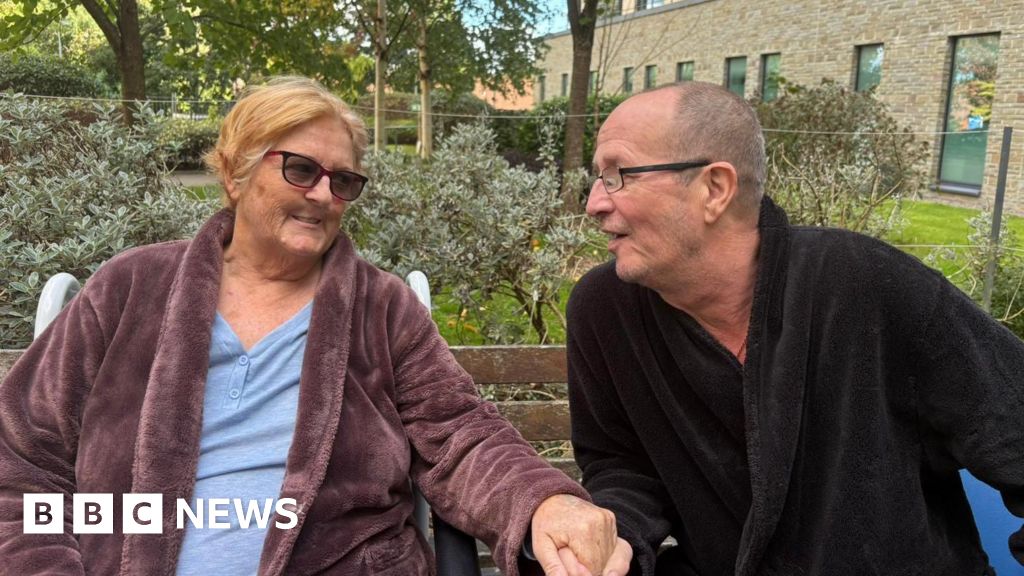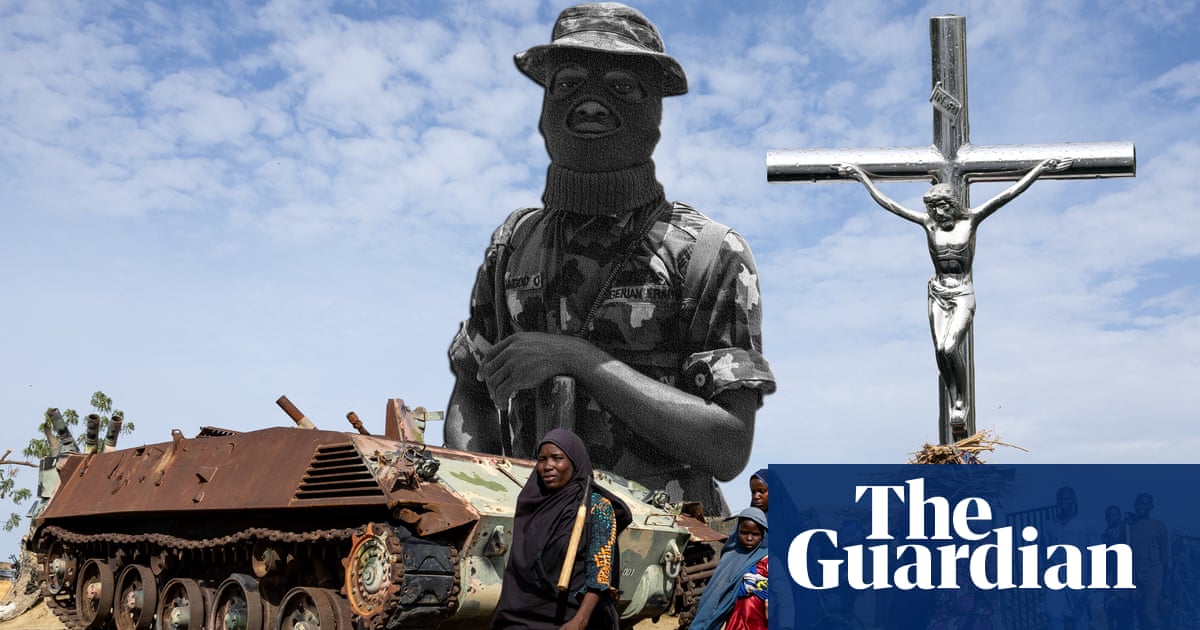In another excerpt of his interview with CBS’s “60 Minutes” set to air tonight, President Trump was asked about videos showing immigration authorities shoving a young mother, deploying tear gas in Chicago or smashing car windows. Trump said he did not believe the tactics by Immigration and Customs Enforcement agents and other immigration officials had gone too far. “I think they haven’t gone far enough because we’ve been held back by the, by the judges, by the liberal judges,” Trump said, adding that he was OK with the tactics captured on video. “You have to get the people out.”
The Trump administration has created a new page on the official White House website resembling an account on the social media website, MySpace, for Democrats. The fake page features the caption “shut it down!” alongside a doctored image of Representative Hakeem Jeffries, the minority leader, with a mustache and a sombrero, which Jeffries previously said was racist. It is the latest example of the brash, at times vitriolic, trolling by the White House as the government shutdown grinds to its five-week mark. President Trump, however, has mostly kept the issue of the shutdown at a distance, even as American families are worried about losing food stamp benefits and hundreds of thousands of workers have no idea when they will be paid again.
Image
The nuclear testing ordered by President Trump will not involve nuclear explosions, U.S. Energy Secretary Chris Wright said on Sunday, clarifying that the testing would involve “the other parts of a nuclear weapon” to ensure they are working properly.
Mr. Wright’s comments came four days after Mr. Trump made the declaration that he was ordering the U.S. military to resume nuclear testing “on an equal basis” with other countries, raising the specter of a return to the worst days of the Cold War.
“I think the tests we’re talking about right now are systems tests,” Mr. Wright said in an interview on the Fox News show “The Sunday Briefing.” “These are not nuclear explosions. These are what we call noncritical explosions.”
Mr. Wright said Americans in places like Nevada, where the United States has a nuclear test site bigger than the state of Rhode Island, should not expect to see a mushroom cloud.
On Wednesday — minutes before he met with President Xi Jinping of China in South Korea — Mr. Trump said in a social media post that he was ordering the Pentagon to step up testing of nuclear weapons.
“We’ve halted it years — many years — ago,” Mr. Trump later told reporters, referring to the last U.S. explosive test of a nuclear weapon in 1992. “But with others doing testing, I think it is appropriate that we do also.”
But detonation tests are not common anymore: The only nation that has been regularly doing nuclear tests in the past quarter-century is North Korea, and its last explosive test was in September 2017.
China has rapidly expanded its nuclear stockpile and deploying missiles in new silos but it has not tested a nuclear weapon since 1996. Russia has not conducted a confirmed test since 1990, although it did recently declare that it had tested two exotic delivery vehicles for nuclear weapons: a nuclear-powered cruise missile and an undersea torpedo, called Poseidon, that could cross the Pacific to the West Coast of the United States. (The United States itself routinely tests unarmed missiles.)
In 1993, the Clinton administration announced plans for a treaty in which nations would forgo nuclear blasts. Although the 1996 test-ban treaty never officially went into force, it created a global norm of not testing the destructive bombs.
Washington is currently undergoing an effort to replace its warheads with updated versions. The overall cost of the sprawling program over three decades is estimated at $1.7 trillion.
Mr. Wright on Sunday said that testing was underway on the new nuclear systems.
“And again, these will be nonnuclear explosions,” Mr. Wright said. “These are just developing sophisticated systems so that our replacement nuclear weapons are even better than the ones they were before.”
Image
Dr. George Tidmarsh, the head of the Food and Drug Administration’s drug division, said he was placed on administrative leave on Friday after he had raised concerns about the legal basis of a new program for the rapid approval of some new drugs.
Dr. Tidmarsh, a drug industry veteran who joined the agency in July, said in an interview Sunday that he believed the new program injected politics into the drug review program, superseding decisions based on science.
He was placed on leave Friday pending the outcome of an investigation by the inspector general for the Department of Health and Human Services. On Sunday, he said that he believed the inquiry was a form of retaliation and that he had offered his resignation.
Dr. Tidmarsh also said that he did not want to work in a toxic environment that he attributed to Dr. Vinay Prasad, the agency’s chief medical and scientific officer, who also oversees vaccines and gene therapies. Dr. Prasad was ousted from the agency in July but brought back. A health department spokesman did not immediately respond to questions.
The tumult at the F.D.A. is just the latest in a series of ousters, firings and high-profile disagreements under the nation’s health secretary, Robert F. Kennedy Jr. Several of his top staff members were pushed out or resigned in recent months.
The most high-profile so far was the firing of Susan Monarez after she had served only a month as director of the Centers for Disease Control and Prevention. She told senators that she was fired after she had refused to sign off on recommendations from Mr. Kennedy’s vaccine advisory panel, which he has filled with mainly vaccine skeptics.
Dr. Tidmarsh said his concerns stemmed from the F.D.A.’s announcement in mid-October that it would approve a slate of drugs in record time. The program was meant to convey quick authorizations to drugs that reflected the administration’s priorities, which included addressing unmet medical needs or supporting lower pricing. Candidates for the program included a drug meant to help people break their addiction to vaping and another meant to help children who were born deaf.
“The effort was going to basically change the entire paradigm of the legal underpinnings of drug approvals that have for decades supported the actions on the safety and effectiveness of drugs,” Dr. Tidmarsh said. “There was insufficient legal support for what they wanted to do, and so I didn’t agree.”
Dr. Tidmarsh said the issue came to a head last week when officials met to make the agency’s first official approval decision. The process typically takes months, and involves extensive review and formal opportunities for dissent among agency scientists. But it was expected to be completed in a day.
“I didn’t know the legal underpinnings so all I did is say ‘I don’t think this is a decision,’” he said. “‘I see this as practice run,’ because no one had given anything about the process, the legality of it.”
After the meeting, he said he was told that he had been placed on leave because of an investigation into a LinkedIn post he wrote — and later deleted — about drug approval standards.
Dr. Tidmarsh’s post outlined his concerns about so-called surrogate endpoints, or measures the F.D.A. sometimes uses in drug approval decisions. One such endpoint would be to determine whether a cancer drug shrunk a tumor. However, evidence of a higher certainty for the effectiveness of a cancer drug would include extending a person’s survival or measurably improving quality of life.
Chris Wright, the energy secretary, said on Sunday that the nuclear testing ordered by President Trump last week will not involve nuclear explosions. “I think the tests we’re talking about right now are systems tests. These are not nuclear explosions,” Wright said on Fox News’s “The Sunday Briefing.” “These are what we call noncritical explosions.”
Rather, Wright said, the administration would be testing “all the other parts of a nuclear weapon” to ensure they can set up an explosion and Americans should not expect to see a mushroom cloud. “The testing that we’ll be doing is on new systems,” he said. “And again, these will be nonnuclear explosions. These are just developing these sophisticated systems so that our replacement nuclear weapons are even better than the ones they were before.”
Dr. George Tidmarsh, the head of the Food and Drug Administration’s drug division, said on Sunday that he had been placed on administrative leave after raising concerns about the legal basis of a new program for rapid approval of some new drugs. Tidmarsh, a drug industry veteran who joined the agency in July, said in an interview that he believed the new program injected politics into the process, setting aside decisions based on science. He said he was placed on leave on Friday pending an unrelated investigation by the Health and Human Services inspector general, but added that he believed the investigation was a form of retaliation and that he had offered to resign.
A health department spokesman did not respond immediately to questions.
Image
President Ahmed al-Shara of Syria will visit Washington this month for the first time since he came to power, another step in the transformation of the former rebel leader once wanted by the United States as a terrorist with a $10 million bounty on his head.
A White House official, speaking on the condition of anonymity to discuss the plans for the meeting, said he will meet with President Trump on Nov. 10 at the White House.
In September, Mr. al-Shara visited New York and became the first Syrian president to address the United Nations General Assembly in 58 years.
The U.S. special envoy for Syria, Thomas J. Barrack Jr., said on Saturday that Mr. al-Shara will be in Washington to “hopefully” sign an agreement to join 88 other countries in the global coalition to defeat the Islamic State. He was speaking at the Manama Dialogue, an annual security conference in the Gulf nation of Bahrain.
Speaking at the same conference, Foreign Minister Asaad Hassan al-Shaibani of Syria confirmed on Sunday that Mr. al-Shara would visit the U.S. capital in November and said the reconstruction of Syria would be among the topics to be discussed, according to Syrian state media.
Mr. al-Shara led the rebel offensive almost a year ago that ended more than five decades of dictatorship under the Assad family. A former Islamist rebel once linked to Al Qaeda, Mr. al-Shara has since redefined himself as a statesman and expanded Syria’s foreign relations in a bid to help his country rebuild after a brutal and destructive civil war that lasted nearly 14 years.
In December, the U.S. government dropped the $10 million bounty on Mr. al-Shara’s head. In July, Secretary of State Marco Rubio announced the revocation of the terrorist designation for Hayat Tahrir al-Sham, the rebel group that Mr. al-Shara led before he overthrew President Bashar al-Assad.
Mr. al-Shara founded the Syrian branch of Al Qaeda before breaking ties with the terrorist group in 2016.
Now he and his government appear set to join the U.S. and dozens of other countries in fighting another terrorist group.
Though the Islamic State lost its last territorial foothold in Syria in 2019, it continues to have a presence in the country, especially in the vast desert region in the center, and carries out occasional attacks.
As Syria goes through a rocky political and security transition after the war, there are fears that the terrorist group could re-emerge and try to free thousands of its former fighters who are held in Syrian prisons guarded by U.S.-backed Syrian Kurdish forces.
Ismaeel Naar and Zolan Kanno-Youngs contributed reporting.
Speaker Mike Johnson blamed Democrats for the lapse in Supplemental Nutrition Assistance Program benefits that began this weekend amid the ongoing government shutdown. “They had the opportunity to have SNAP benefits flow, to let air traffic controllers be paid, to take care of all these problems and pay the troops,” he said Sunday on “Fox News Sunday.” “And they said no.”
Roughly 42 million SNAP receipients are at risk of having their benefits cut after the program ran out of funding as a result of the shutdown. Johnson said President Trump has “heroically funded” the program, although it remained unclear how the administration would respond to a judge’s order to resume funding benefits this week using an existing emergency reserve.
The Federal Aviation Administration has slowed down flights to several airports across the country so far on Sunday. Departures to San Francisco International Airport, Newark Liberty International Airport and Austin-Bergstrom International Airport are delayed because of air traffic controller shortages. In Texas, an elevated absence rate of Transportation Security Administration officers is also causing longer security lines at Hobby Airport and Bush Intercontinental Airport, with both airports warning that wait times could exceed an hour.
A shortage of controllers, who were stretched thin even before they began working without pay during the shutdown, set off cascading delays on Friday.
Image
In an excerpt of an interview with CBS’s “60 Minutes” set to air tonight, President Trump was asked whether he would order U.S. forces to defend Taiwan if it were invaded by China. “You’ll find out if it happens,” Trump replied. He declined to specify what action the U.S. would take, if any, in response to an invasion of the democratically governed island, which Beijing claims as its own. He also said President Xi Jinping of China never brought up the issue when the two leaders met in South Korea last week.
Image
The U.S. military killed at least three people in another strike on a boat in the Caribbean Sea, Defense Secretary Pete Hegseth said on Saturday, in the latest attack on vessels that the Trump administration has claimed are being used to smuggle drugs. It was the 15th announced strike in the offensive that began in early September.
Announcing the attack on social media, Mr. Hegseth posted a video that appeared to show an explosion. He said the vessel “was known by our intelligence to be involved in illicit narcotics smuggling,” but he did not provide evidence to support the claim. He said Saturday’s strike took place in international waters.
The latest attack raised the toll of the campaign to about 65 people killed, including a man who is presumed dead after a search by the Mexican Navy failed to find someone whom the United States described as surviving an attack on Oct. 27 in the eastern Pacific Ocean.
A wide range of specialists in laws governing the use of force have decried the killings as illegal because the military is not allowed to deliberately target civilians who pose no threat of imminent violence, even criminal suspects.
The administration says the strikes are lawful because President Trump determined that the United States is in a formal armed conflict with drug cartels. The Pentagon has about 10,000 U.S. troops ashore and afloat in the region, and another 5,000 are on their way aboard the aircraft carrier U.S.S. Gerald R. Ford and its accompanying warships.
Transportation Secretary Sean Duffy told ABC’s “This Week” that Americans should expect air travel to get worse the longer the government shutdown goes on. “We will delay, we will cancel any kind of flight across the national airspace to make sure people are safe, but there is a level of risk that gets injected into the system when we have a controller that’s doing two jobs instead of one,” Duffy said. “If the government doesn’t open in the next week or two, we’ll look back as these were the good days, not the bad days. It’s only going to get worse.”
Image
Image
President Trump on Saturday threatened Nigeria with potential military action and said the United States might cut off aid, accusing the West African country’s government of failing to protect Christians.
Mr. Trump said in a post on social media that he was instructing the Pentagon “to prepare for possible action” to wipe out “Islamic Terrorists” in the country. “If we attack,” he wrote, “it will be fast, vicious, and sweet, just like the terrorist thugs attack our CHERISHED Christians!”
Later on Saturday, Defense Secretary Pete Hegseth responded to the president’s post with: “Yes sir.” The Pentagon, he said, was “preparing for action.”
“The killing of innocent Christians in Nigeria — and anywhere — must end immediately,” he said, adding, “Either the Nigerian Government protects Christians, or we will kill the Islamic Terrorists who are committing these horrible atrocities.”
The announcements came a day after Mr. Trump said he would designate Nigeria a country of particular concern, a label given by the government for nations “engaged in severe violations of religious freedom.” He claimed on social media on Friday that “Christianity is facing an existential threat in Nigeria,” adding that thousands of Christians were facing targeted violence — a claim made by some evangelical groups and U.S. lawmakers.
Nigeria has denied the accusations, and its president, Bola Ahmed Tinubu, on Saturday defended the country’s protection of religious groups, before Mr. Trump’s threat.
The characterization of Nigeria “as religiously intolerant does not reflect our national reality, nor does it take into consideration the consistent and sincere efforts of the government to safeguard freedom of religion and beliefs for all Nigerians,” he said in a statement, responding to Mr. Trump’s announcement on Friday.
Mr. Trump’s threat of military action faces major challenges. The United States withdrew its forces last year from Niger, to Nigeria’s north, and airstrikes would most likely seek to target small groups scattered across a large area. Effective military action against these groups, analysts say, is likely to require assistance from the Nigerian military and government — which Mr. Trump also threatened to cut off from assistance.
Around 220 million people live in Nigeria, and parts of the country have long suffered violence at the hands of extremist groups, including Boko Haram, an Islamist terror group that has attacked Christians and Muslims it does not consider faithful enough.
But there are also secessionists in the south, criminal groups known for kidnappings in the northwest and other violent groups with their own motives.
Extremist violence in the country “affects large numbers of Christians and Muslims in several states across Nigeria,” the United States Commission on International Religious Freedom found in 2024.
Mr. Trump has already targeted American aid work around the world, working to dismantle the U.S. Agency for International Development, which has long been central to distributing foreign aid. Nigeria has been a major recipient of U.S. global health funding, relying on it for about 21 percent of its national health budget.
Ruth Maclean, Eric Schmitt and Helene Cooper contributed reporting.
Image
One day after ordering the Trump administration to continue funding food stamps during the shutdown, a federal court gave the government a choice. It can either make full payments by Monday, or partial payments by Wednesday, to spare low-income Americans from hardship.
The written order by Judge John J. McConnell of the U.S. District Court for the District of Rhode Island underscored the vast uncertainty that still surrounds the Supplemental Nutrition Assistance Program, or SNAP, whose roughly 42 million recipients remain in the dark as to when they may see their next round of benefits.
A spokeswoman for the White House budget office did not respond to a request for comment. Late Friday, President Trump predicted that food stamp aid would “unfortunately be delayed” in November, and warned that the payments would not begin until he received “appropriate legal direction” from the court.
The legal saga began earlier that day, when Judge McConnell told the Trump administration that it must tap an existing, emergency reserve in order to pay for SNAP starting Saturday, when its typical budget was set to run out. Absent that intervention, the administration’s actions would have cut off assistance to the roughly one in eight Americans who are enrolled in the program.
But the thrust of the judge’s order raised logistical questions. The SNAP reserve totals about $5 billion, less than the roughly $8 billion needed to pay full SNAP benefits each month. Even if they used the money, officials at the Agriculture Department had also warned they might have to slash benefits by more than half, and that it could take weeks to pay them out because of technical constraints.
So, on Saturday, Judge McConnell clarified his ruling, citing the president’s request, and offered the Trump administration a timeline.
He said the government “must make” a partial payment by Wednesday, but he also encouraged federal officials to explore the use of a second source of money that might allow it to pay SNAP benefits more quickly and in full. He pointed specifically to a pot of funds at the Agriculture Department largely composed of tariff revenue, which the government had used earlier in the shutdown to preserve another federal nutrition program.
The judge said that the two funding sources, combined, could reduce any delay in delivering SNAP benefits, and alleviate “irreparable harm” facing families — and he ordered the administration to make those full payments by Monday.
It remained unclear how the Trump administration might proceed — or, potentially, if it might appeal the ruling. The Justice Department appeared to signal the mere possibility in a late Friday filing with the court, hinting that it was “considering whether any emergency relief is required.”
A spokesman for the agency did not respond to a request for comment.

 German (DE)
German (DE)  English (US)
English (US)  Spanish (ES)
Spanish (ES)  French (FR)
French (FR)  Hindi (IN)
Hindi (IN)  Italian (IT)
Italian (IT)  Russian (RU)
Russian (RU)  3 weeks ago
3 weeks ago
























Comments